Other
A-level Sophocles' Oedipus Notes, Quotes, Analysis and Secondary Sources
- Course
- Institution
Sophocles' Oedipus revision guide made for the A-level OCR Classical Civilisation 'Greek Theatre' module, but likely applicable across exam boards. An 11 page, in-depth revision resource including analysed quotes organised theme-by-theme with lots of secondary sources to help you achieve top grade...
[Show more]



